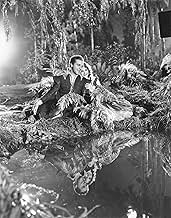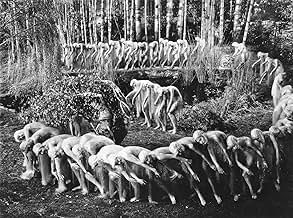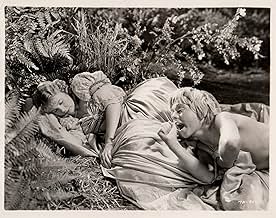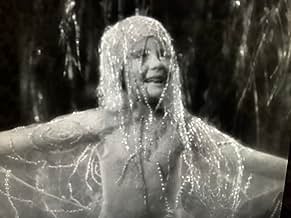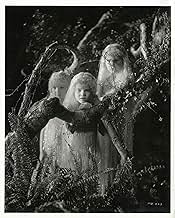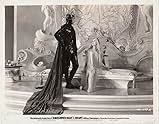IMDb RATING
6.8/10
4.1K
YOUR RATING
Two couples and a troupe of actors have an encounter with some mischievous fairies in the forest.Two couples and a troupe of actors have an encounter with some mischievous fairies in the forest.Two couples and a troupe of actors have an encounter with some mischievous fairies in the forest.
- Directors
- Writers
- Stars
- Won 2 Oscars
- 6 wins & 2 nominations total
Olivia de Havilland
- Hermia - In Love with Lysander
- (as Olivia de Haviland)
Nini Theilade
- Fairie - Attending Titania
- (as Nina Theilade)
- Directors
- Writers
- All cast & crew
- Production, box office & more at IMDbPro
Featured reviews
Since "Shakespeare in Love" made that particular playwright happening and new, check out this, Warner Bros.' wild, expensive, free-wheeling adaptation of "A Midsummer Night's Dream".
For me, James Cagney makes the movie. He's Nick Bottom, the leader (or so he believes) of a traveling troupe of actors. He gives an invigorating performance--the screen is his. At one point, he gets to wear a donkey's head (if you know the play, you know what I'm talking about), but it doesn't faze him in the least. Cagney, the most energetic screen actor, doesn't let his over-the-top approach mar his skill or care with The Bard's great words. It's the test of anyone wishing to act out a part in a Shakespeare play, which Cagney passes, to "speak" the dialogue, and by doing so, make what might be confusing on the page understandable to audiences on the screen or stage.
Warner really spared no expense with this production, which I think might have been the costliest of that year. The whole affair is like a dream in every way--it seems to sway in the wind, fragile to the touch. It features Mendolssohn music, soft-white photography (the great Hal Mohr), and some of the most incredible sets and costumes you're likely to see in a 1930s film.
Nominated for three Academy Awards: Picture, Cinematography and Editing. Bested by "Mutiny on the Bounty" for the first, it won the other two.
For me, James Cagney makes the movie. He's Nick Bottom, the leader (or so he believes) of a traveling troupe of actors. He gives an invigorating performance--the screen is his. At one point, he gets to wear a donkey's head (if you know the play, you know what I'm talking about), but it doesn't faze him in the least. Cagney, the most energetic screen actor, doesn't let his over-the-top approach mar his skill or care with The Bard's great words. It's the test of anyone wishing to act out a part in a Shakespeare play, which Cagney passes, to "speak" the dialogue, and by doing so, make what might be confusing on the page understandable to audiences on the screen or stage.
Warner really spared no expense with this production, which I think might have been the costliest of that year. The whole affair is like a dream in every way--it seems to sway in the wind, fragile to the touch. It features Mendolssohn music, soft-white photography (the great Hal Mohr), and some of the most incredible sets and costumes you're likely to see in a 1930s film.
Nominated for three Academy Awards: Picture, Cinematography and Editing. Bested by "Mutiny on the Bounty" for the first, it won the other two.
Pre-1950 film adaptations of Shakespeare's plays have varied in quality. Some were good and more, especially Laurence Olivier's brilliant 1948 adaptation of 'Hamlet', though that is something to see on its own terms. Others were average or less, with one example being the 1936 film of 'As You Like It', which was very static and stagy and had a badly miscast Rosalind. Had little doubt that this film would be at least above average, considering that the play is one of Shakespeare's best and because the cast is so good.
1935's 'A Midsummer Night's Dream' is a dream. To me it is not just the best screen/film adaptation of 'A Midsummer Night's Dream' (bar none), it is also one of the best film versions of any Shakespeare play pre-1950 and perhaps overall. As well as one of the best adaptations of 'A Midsummer Night's Dream' full stop, for me only the National Theatre Live and Julie Taymor productions are better though once again as standalones. It has very few if any of the things that other early Shakespeare film adaptations did and is full of magic and entertainment value. It's not perfect, but there is so much to adore here.
For one thing, the photography is exquisite and the settings and such are very lavish and rustic. The world one is immersed in being truly fantastical. Also loved the use of Mendelssohn's music, the music itself some of his best loved for good reason (and he was only 16 when he wrote it!) and it is used cleverly and tastefully. Korngold's, one of my favourite film composers, contribution is typically lush and rousing without being over-scored.
The dancing is beautifully choreographed and danced with great grace and elegance, as well as shot and edited in an appropriately dream-like way. The writing is still incredibly funny, without trying too hard, and also beautifully poetic. The story is incredibly charming and told with great spirit, doing nothing to confuse a story that is already quite complicated. The action is opened up enough to not betray stage origins and the atmosphere is suitably magical. The direction is beautifully theatrical, Reinhardt's theatre roots are evident without hurting the drama. The comedy hits the mark, especially with Bottom.
Most of the performances are great, with two exceptions. James Cagney is a sheer delight as Bottom in a role that is so different to what he was usually cast as and shows that he did have a light and funny side to him. Mickey Rooney's performance has left people more mixed, count me in as one of the people that loved his Puck and consider it one of his better performances. The mischievous energy he embodies is infectious. Olivia De Havilland is a charming Hermia and Victor Jory a sinister, amusing and textbook Oberon. Anita Louise's Titania is spirited and regal and Ian Hunter and Joe E. Brown are very good.
Only two performances don't come over as well. One is Dick Powell, who is very bland and too earnest. The other is the very irritating Hugh Herbert, who was always an acquired taste and was very take and leave for me.
Also found the finale on the overblown side.
Concluding however, great. 9/10.
1935's 'A Midsummer Night's Dream' is a dream. To me it is not just the best screen/film adaptation of 'A Midsummer Night's Dream' (bar none), it is also one of the best film versions of any Shakespeare play pre-1950 and perhaps overall. As well as one of the best adaptations of 'A Midsummer Night's Dream' full stop, for me only the National Theatre Live and Julie Taymor productions are better though once again as standalones. It has very few if any of the things that other early Shakespeare film adaptations did and is full of magic and entertainment value. It's not perfect, but there is so much to adore here.
For one thing, the photography is exquisite and the settings and such are very lavish and rustic. The world one is immersed in being truly fantastical. Also loved the use of Mendelssohn's music, the music itself some of his best loved for good reason (and he was only 16 when he wrote it!) and it is used cleverly and tastefully. Korngold's, one of my favourite film composers, contribution is typically lush and rousing without being over-scored.
The dancing is beautifully choreographed and danced with great grace and elegance, as well as shot and edited in an appropriately dream-like way. The writing is still incredibly funny, without trying too hard, and also beautifully poetic. The story is incredibly charming and told with great spirit, doing nothing to confuse a story that is already quite complicated. The action is opened up enough to not betray stage origins and the atmosphere is suitably magical. The direction is beautifully theatrical, Reinhardt's theatre roots are evident without hurting the drama. The comedy hits the mark, especially with Bottom.
Most of the performances are great, with two exceptions. James Cagney is a sheer delight as Bottom in a role that is so different to what he was usually cast as and shows that he did have a light and funny side to him. Mickey Rooney's performance has left people more mixed, count me in as one of the people that loved his Puck and consider it one of his better performances. The mischievous energy he embodies is infectious. Olivia De Havilland is a charming Hermia and Victor Jory a sinister, amusing and textbook Oberon. Anita Louise's Titania is spirited and regal and Ian Hunter and Joe E. Brown are very good.
Only two performances don't come over as well. One is Dick Powell, who is very bland and too earnest. The other is the very irritating Hugh Herbert, who was always an acquired taste and was very take and leave for me.
Also found the finale on the overblown side.
Concluding however, great. 9/10.
The movie is dated, true. In fact, seeing 30's Hollywood's version of Shakespearian England's version of Athenian costuming is a delight in itself. But the actors in this rendition are just amazing. Not only is the cast impressive (Cagney, Brown, Rooney, D'Havilland, Powell), but they are doing the roles with the right mixture of buffoonery and dedication to Shakespeare's love of high and low comedy together.
The casting of Cagney as Bottom was brilliant, his mixture of swagger and obliviousness is perfect, especially when played off of the great Joe E. Brown, who's rubber faced quiet performance is uproarious. Young Mickey Rooney is a wonderful puck, light and athletic, it may be his finest work. The special effects manage to give off the feeling of faerie, without overpowering what is going on. And the weaving of the two stories together works as well as might be hoped for.
I consider this to be the classic definitive Midsummer's Night Dream films. No other can ever measure up.
The casting of Cagney as Bottom was brilliant, his mixture of swagger and obliviousness is perfect, especially when played off of the great Joe E. Brown, who's rubber faced quiet performance is uproarious. Young Mickey Rooney is a wonderful puck, light and athletic, it may be his finest work. The special effects manage to give off the feeling of faerie, without overpowering what is going on. And the weaving of the two stories together works as well as might be hoped for.
I consider this to be the classic definitive Midsummer's Night Dream films. No other can ever measure up.
While the 1999 version is receiving mixed reviews, this classic version with a star-studded cast is delightfully mischievous. Mickey Rooney, a very young boy, has never been better cast, nor delivered a better performance. And despite the dream sequences not always being clearly distinguished from real time motion, one catches on quickly enough. Everyone, even Dick Powell, delivers his lines mellifluously, something that cannot be said for the 1999 version. There's more energy and zeal, more mystery and charm, more color(though B&W) and clarity, despite its age. Remarkable performances under exellent direction work together to make the Bard sparkle, and the film enchant.
Though another commentator disagrees, if Rooney is not the greatest Puck you've ever seen, then tell me who is. With all respect to a talented actor, the sad part is that he played his greatest role when he was, what, 14?
The greatest Shakespeare movie of all time, in my opinion. The dazzling cinematography for its age. The fact that they got the mostly American actors to speak the lines properly. That inspired scene with a fairy jazz band. The special "star spangled" effect.
The criticism that scenes are overly long is related to a more modern perception of how long a scene should be, and alas, Shakespeare is mostly unmercifully cut (look at Olivier's last "King Lear"--Branaghs "Hamlet" would be an exception). Shakespeare just wrote long scenes. You woulnd't have Juliet on the balcony just say "I love you, Romeo," and disappear.
The greatest Shakespeare movie of all time, in my opinion. The dazzling cinematography for its age. The fact that they got the mostly American actors to speak the lines properly. That inspired scene with a fairy jazz band. The special "star spangled" effect.
The criticism that scenes are overly long is related to a more modern perception of how long a scene should be, and alas, Shakespeare is mostly unmercifully cut (look at Olivier's last "King Lear"--Branaghs "Hamlet" would be an exception). Shakespeare just wrote long scenes. You woulnd't have Juliet on the balcony just say "I love you, Romeo," and disappear.
Did you know
- TriviaWhen the forest that Max Reinhardt designed could not be lit properly, cinematographer Hal Mohr thinned the trees slightly, sprayed them with aluminum paint and covered them with cobwebs and tiny metal particles to reflect the light. As a result, he became the first (and only) write-in winner of an Academy Award.
- GoofsCorrective lenses were introduced in the 13th century so they could have been worn in Shakespeare's time.
- Quotes
Hermia, in Love with Lysander: [to Helena] How low am I, you painted maypole? Speak! How low am I? I am not yet so low but that my nails can reach into your eyes!
- Crazy creditsThe opening credits appear as if they were "trickling down" from the top of the screen.
- Alternate versionsThe original 132-minute roadshow version of this film has been restored, shown on cable, and issued on videocassette and DVD. For many years, though, this film was shown only in its general release version, a 117-minute version painstakingly edited by the studio (so that the cuts would not be noticeable), which shifted the order of some sequences and eliminated others.The 2007 DVD release also restores the Intermission title card, not seen since the film's original roadshow release in 1935, as well as including the overture and exit music.
- ConnectionsFeatured in A Dream Comes True (1935)
- SoundtracksA Midsummer Night's Dream: Overture and Incidental Music
(1826) (uncredited)
Music by Felix Mendelssohn
Adapted by Erich Wolfgang Korngold
Heard throughout the film
- How long is A Midsummer Night's Dream?Powered by Alexa
Details
- Release date
- Country of origin
- Official site
- Language
- Also known as
- A Midsummer Night's Dream
- Filming locations
- Production companies
- See more company credits at IMDbPro
Box office
- Gross worldwide
- $2,616,000
- Runtime2 hours 13 minutes
- Color
- Sound mix
- Aspect ratio
- 1.37 : 1
Contribute to this page
Suggest an edit or add missing content


